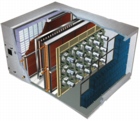Many fans are better than one, according to Eaton-Williams

Using a number of small fans in air-handling units rather than a single large fan enables Eaton-Williams to add a range of benefits to its Moducel LKP range of air-handling units.
Eaton-Williams has developed a new approach to moving air in air-handling units, based on using a number of small-diameter direct-driven fans rather than a single large fan. Fan Wall Technology has been developed by Eaton-Williams’s sister company Huntair in the USA and is being applied across Moducel’s LKP range of air-handling units. Joe Wieckowski, general sales manager with Moducel, says, ‘Fan Wall is ideal for specialised applications, and air handlers using the technology are typically 6 to 10% more energy efficient.’ The technology also solves many problems usually associated with upgrading air handlers, particularly in older structures, while increasing efficiency and control of temperature and humidity. The system is more compact than a large single fan, enabling the footprint of an AHU to be reduced by up to 50%. Noise levels are also about 12 dB lower, and air discharge is very uniform, even directly after the fan bank. Variable-speed drives permit adjustment of airflow rates by turning fans on or off. The use of smaller fans reduces the generation of low-frequency noise compared with a large one.
Related links:








